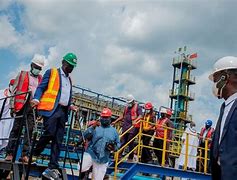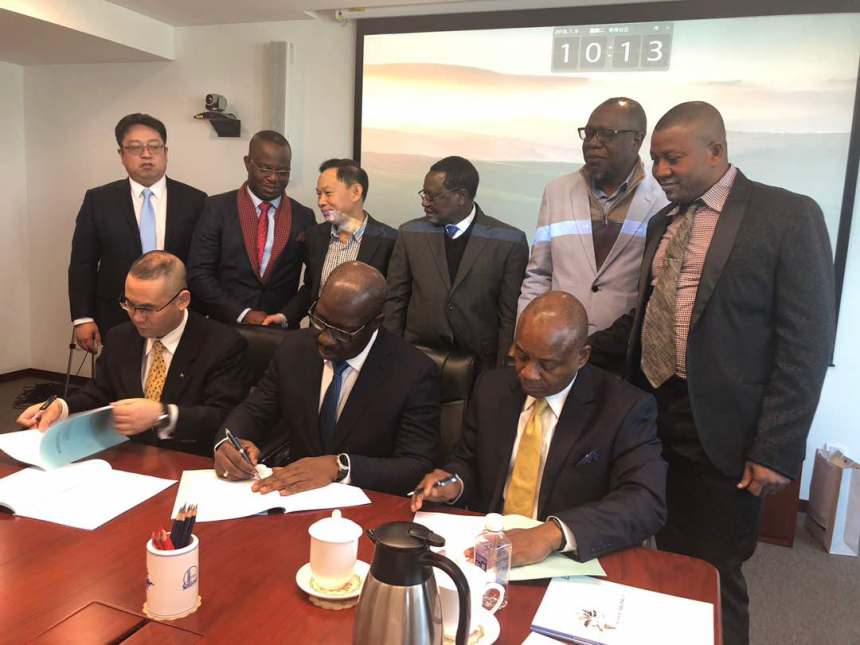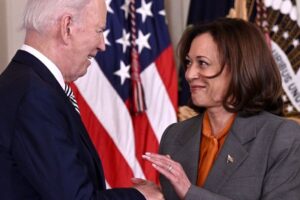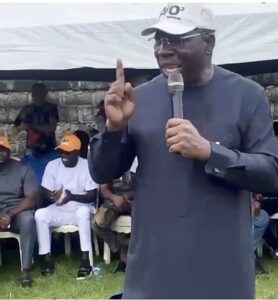How Governor Obaseki Transformed Edo State into a ‘Private Enterprise’

Governor inspecting Edo Refinery
By Correspondent
As the administration of Mr Godwin Nogheghase Obaseki draws to a close, it is important to evaluate the performance at least, to place on record, the progress the state made during his stewardship.
Stakeholders and critics, have argued that Obaseki has failed to deliver on his campaign promises, especially the 200,000 jobs, Agripreneur, Edojob, housing, healthcare, roads, education and rural development.
But Obaseki in his closing chapter, disagrees with his critics and has listed some high profile projects as part of his adninistration’s achievements.

Obaseki, Osime signing Edo Refinery Agreement in Beijing China
In a recent publication, Mr Godwin Obaseki of Edo State listed some projects as those his ease of doing business and MOUs attracted to the state.
They were 23 or so on his list, including the Edo Modular Refinery; Dufil; Market Square Mall; Jara Mall; Green Hill Farms Ethanol Refinery and Duport Modular Refinery Energy Park.
Obaseki also had on his list, the Ossiomo Power – his star Independent Power Project; Edo Fertilizer and Chemical Company Limited; Dangote Cement, and the miniature Golf Mew Estate that was built on a wetland less than a minute drive from Government House; the dream-pipe Emotan Garden Estate and Benin City Mall.
Surprisingly, he listed the Benin River Port, Edo Enterprise Park and Uromi Cassavita Factory in his scorecard. Midwest Herald can authoritatively report that both the Benin Enterprise Park ownwd by Philip Iheanacho’s Amaya Real Estate Holdings Limited and Benin Port have been abandoned for variant of reasons. Iheanacho is also the front for Museum of West African Art (MOWAA), the private non profit trust.
The governor equally praised himself high with the listing of some companies in the agric sector, not minding the fact that, Edo State farmers under ‘Edo State Concerned Farmer Association has already petitioned him to former President Mohammadu Buhari and the Economic and Financial Crimes Commission (EFCC) in 2020 for disbursing loans to “portfolio farmers.”
The company Obaseki listed are Agripam Limited; Saro Oil Palm; Fayus Nigeria Limited; Saturn Farms and Loquat Farms.
The hazy records on the ownership of some of these companies and projects is capable of robbing Obaseki, the opportunity to list them as projects executed by his administration.
For a start, the Edo Refinery (ERPC) located in Ikpoba-Okha LGA, Edo State is listed by the company as a 100% owned subsidiary of AIPCC Energy.
AIPCC Energy Limited is a company solely owned by African Infrastructure Partners (AIP), the holding company founded and solely owned by AIPCC’s Executive Chairman and CEO, Mr. Michael Osime, whose business interests include: Oil, Gas, Power, Fertilizer, and Financial Services.
According to the company’s registration record, AIPCC Energy was formed for the purpose of developing modular refineries, flare gas recovery units, gas processing plants, aromatic hydrocarbon processing, and other processes in the petrochemical value-chain.
AIP on the other hand listed as their core interest, affordable housing, sustainable agriculture and agro processing, offgrid and hybrid renewable power, and investments in fintech and financial inclusion.
Curiously, Edo State is their only operation since the company was incorporated.
Michael Osime, chairman of the AIPCC, owners of Edo Refinery in Ologbo is the chairman of ICMG Securities, and longtime business partner of Governor Obaseki at the Nigerian Capital Market.
The plausible questions that has been raised by stakeholders in Edo State is that, if Edo Refinery is 100% owned by Michael Osime’s AIPCC, what is the share of Edo State in the company?

On January 10, 2018, in far away China, Obaseki reported via media that he signed a Memorandum of Understanding (MoU) for a 5,500bpd modular refinery between “Edo State Government and SINOPEC of China,” at SINOPEC headquarters in Beijing. The role of Osime and his ICMG was not mentioned, even though he was on the trip to China.
How did the business between SINOPEC and Edo State become the sole property of AIPCC with Michael Osime as chairman? What has happened to the billions of Edo State investment in the project?
When Midwest Herald visited the Uromi Cassavita Company in the course of this report, our team of investgators was told that the company has been allegedly sold to Michael Osime, the chairman of Edo Refinery. This is another project that Obaseki is claiming as his achievement.
The Uromi Cassavita factory was conceived in 2002 by former governor Chief Lucky Igbinedion as parts of his ‘One District, One Industry’ programme he designed to industrialize the state.
The factory was conceived as an agro processing factory with a capacity of 60,000 tonnes of fresh cassava tubers per year to be processed into Cassavita chips, Cassavita starch, Cassavita flour, re-processed waste and others.
The entire factory complex occupies about 10,000 square meters, equivalent of about 10 football fields. It had staff quarters, main factory complex, finished product storage warehouse, waste processing complex, administrative block with canteen, clinic, steam generation/electricity building with two tons/hour steam boiler and two sets of electricity generators – 500kva and 300kva respectively, to compliment the electricity provided by the 11 KV electricity supply from a 1000Kva transformer substation, nearby.
The complex was linked by well paved roads and enclosed by an extensive wall fence of 1.2Km in length and a gate house.
The project went through test run before the exit of Governor lucky Igbinedion in 2007.
In addition to the Uromi Cassavita company, the administration of Igbinedion also built the fruit juice in Ehor, Edo fertilizer and Chemical Company and sustained the Edo Cement in Okpilla, Edo North. Obaseki has since sold all without records of how he applied the proceeds.
From his record of stewardship, Obaseki has claimed that he attracted the Edo Fertilizer and Chemical Company to the state and mischievously listed it as “investment attracted to Edo State through MOU.” Even at that, Obaseki has failed to disclose Edo State shares in the company that was built by tax payers money by the previous administration.
Three years after Edo State farmers protested in Abuja over Obaseki’s alleged misuse of the sum of ₦75 Billion Naira Agricultural Loans secured by his administration, the group which is led by a local farmer – Comrade Afeiye Muhammed is still waiting on both the EFCC and presidency to look into their claim that the loans that were procured from the Central Bank of Nigeria and from the World Bank ended up in the pockets of portfolio farmers in and out of Edo State.
In the petition against Obaseki, they claimed that none of their members benefited from the CBN or World Bank loans, in spite of the fact that they applied for it since 2017. The few successful farmers that was contacted, have also petitioned the EFCC that their accounts were operated by Sterling Bank without their knowledge and all they got was debit alert for procurement of tractors, fertilizers and consultancy fees.
The angry farmers added that: “Over the years, contracts for the implementation of World Bank funded projects in Edo State have been overinflated and awarded to briefcase companies. In some cases, these contracts are never executed or poorly executed after complete payments have been collected by these briefcase companies.”
The farmers therefore called on the CBN, Presidency and EFCC to take “urgent steps to ensure that Edo State Government, SARO Agro Sciences Limited and NIRSAL pay Edo State Farmers, proceeds from the sale of their crops between 2017 and 2019.”
They also called on the CBN and World Bank as well as other financial institutions to stop further disbursement of Loans to Edo State Government, and instead carry out a thorough investigation into how previous loans between 2016 and 2020 were spent, and those responsible for embezzling these Loans should be prosecuted and made to refund the stolen funds.
Continuing, they noted: “We plead with the Governor of CBN and the Country Director of World Bank, not to cover up these fraudulent activities in Edo State, but to immediately commence a thorough forensic investigation in partnership with the EFCC, ICPC and Civil Society Groups in Edo State, and those found to have misappropriated these funds should be prosecuted.”
The smurf surrounding Obaseki’s administration will need a special post-tenure inquest to reclaim the commonwealth of the state that, the present administration has smurfed off the poor Edo people.
See Also: Gov Obaseki’s Scorecard: Edo People Feel Failed By The Healthcare System







4 thoughts on “How Governor Obaseki Transformed Edo State into a ‘Private Enterprise’”